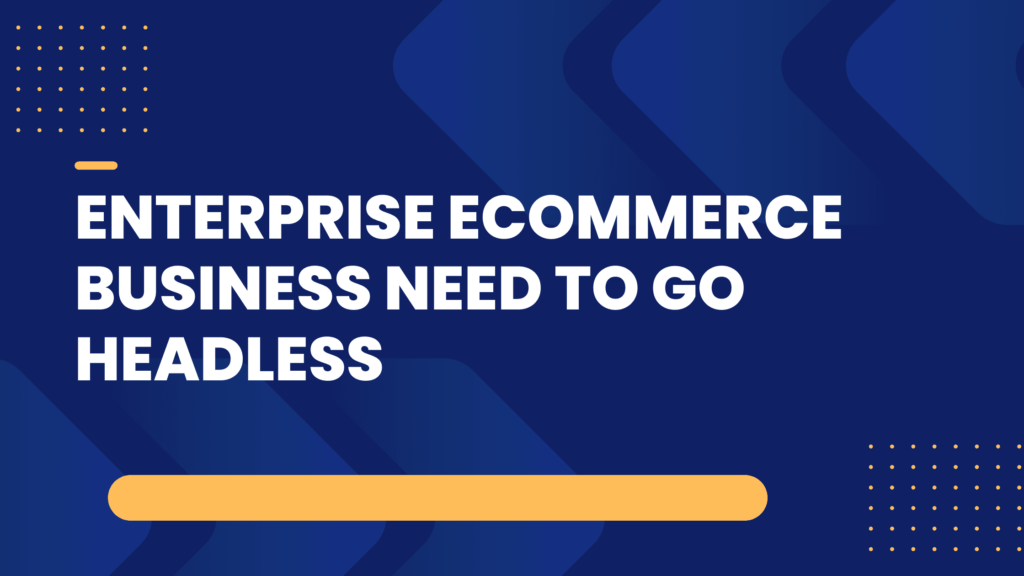Well, for starters, the best enterprise ecommerce business platform should have lots of features that are seamlessly inbuilt and do not require plugins or extensions to run the whole system.
Also, the enterprise ecommerce platform should be flexible enough to accommodate your unique flows and business requirements.
The platform should also be scalable to support the high-volume enterprise business. Apart from these, it should also be ready for mobile commerce as mobile is where your customers are.
What is Enterprise Ecommerce for Business?
Knowing about Enterprise ecommerce is a matter of discovering how to satisfy the customer at the end of the day.
So why still the customers are more important even in the Enterprise-level ecommerce?
In the game of ecommerce, it’s all about the customers and their satisfaction and convenience. So, the Enterprise ecommerce has not exceptional here. It’s prevalent in the round of ecommerce to treat both small businesses and enterprises.

Ecommerce businesses have got their very early impression as online shoppers have more choices to choose from these days. This wide range of options is something they haven’t got in the past decade. That said, no one will go for a second chance by leaving an outstanding first impression.
Every end consumer needs a convenient place to search, choose, shop, and purchase products without any hustle. In simple, offering a seamless shopping experience is what all online shoppers want from ecommerce, without complications.
Now all these demands and customer satisfaction have been fulfilled by the Application programming interfaces (APIs). These ecommerce APIs might be developed internally or via third parties, ultimately designed to meet the new-age customers’ needs.
We know why enterprise-level software is essential to big companies and end-users. It’s all because of the complete flexibility. But before we get into the topic, what exactly is enterprise eCommerce mean?
What is Enterprise Ecommerce Business Software?
In general, enterprise software is a business platform that allows the business to offer its brand, product, or service a broad reach with a global presence. For example, Amazon is the best enterprise business that makes annual multi-million-dollar revenues with an enterprise solution.
This enterprise can be a manufacturer or distributor with multiple warehouses in multiple locations. So the ecommerce business software for these businesses needs to be complex and must be entirely towards the customers individually or on a B2B scale.

Because customers are the currency of enterprise ecommerce, the companies should build a platform that works in multiple ways to handle customer transactions and engagement simultaneously.
So Enterprise eCommerce’s competitive strategy is ultimately to go with all vitals such as acquiring, managing, listing, and finally cultivating a huge customer base.
Let’s discuss the Enterprise ecommerce solution and what businesses should expect from an enterprise-commerce solution, and how the best solutions streamline the backend processes in detail further in this blog.
Must-have functionalities of an Enterprise ecommerce business platforms
Below is the list of mandatory functionalities of a great enterprise eCommerce platform that provide good value to its consumer:
- High scalability to build any additional features into the platform.
- High security and reliability
- Great flexibility to extend the business site functionality.
- User-friendly and intuitive UX and UI and checkout process.
- Keen on offering a great customer experience.
- Improvement in the business process alongside the side of business growth.
- Omnichannel content delivery and ecommerce
- Efficient management of the platform’s products, orders, and catalogs.
- AI-based personalized recommendations
- Durable site management of the business platform as the enterprise has myriad product pages.
- Focus on providing a seamless checkout process.
- Single admin management of multiple stores, sites, and locations.
- Seamless integrates CRM, accounting, ERP, marketing, and other automated tools.
- Support for B2B and B2C ecommerce segment.
Types of Enterprise Ecommerce Software based on the functionality
In general, each enterprise ecommerce solution is of a different type. Based on the functionality they do, a good deal of ecommerce service provider develops the following kind of enterprise solutions:
Ecommerce
Ecommerce solutions are the most common type of enterprise ecommerce software that helps large businesses to sell, earn and handle all the online business processes. It enables end-users and consumers to have a better user experience and offers great customer journeys with communication channels.
Multi-vendor Marketplaces
Mult-vendor marketplace website is a prevailing type of enterprise ecommerce solution as many big brands such as Amazon, Flipkart, and Alibaba are in the marketplace business. In marketplaces, any number of multiple third-party vendors come under a single roof to list and sell their processes.
Product information management
The product management system is a sophisticated enterprise solution that allows the admin to manage a business’s product-related data with substantial product data.
Inventory management systems
Inventory management is very similar to product data management system as it offers vital functionality to monitor and manage the product availability for future deliverability.
Mobile commerce apps
Mobile commerce came as a solution to meet the current market demand to connect smartphone users to the enterprise business brand via the so-called mobile devices.
POS – Point Of Sale
Point of sale or POS is popular among the end-users as they reach the brands they look at and pay wherever they move around.
Online auctions
Online auctions are the platforms that allow businesses to conduct online auctions where the third-party sellers start bidding to have and avail the business on the go.
So what are the architectures that stand best to build an Enterprise ecommerce solution?
Ecommerce architecture for Enterprise business
There is two excellent ecommerce architecture that works best for building enterprise eCommerce software:
Monolith
Monolith is the conventional approach to building an ecommerce software with traditional architecture with deeply interconnected backend and frontend. This monolith architecture is widely regarded as the rigid ecommerce technology that doesn’t scale as much.
Headless commerce
Headless commerce is a microservices-based architecture. It is a wholly decoupled architecture that separates both the frontend and backend. These backend and backend have been connected with the APIs that support greater flexibility, speed, and control. Many ecommerce experts consider headless commerce a most required solution for enterprise businesses as it offers flexible architecture. It is why currently, headless solutions are gaining traction.
Conclusion
As you can see from the above information, Enterprise ecommerce needs a robust platform or solution to go end-to-end in the retail business. These enterprise-level solutions are not on the expensive side, but they develop ultimate enterprise eCommerce environments that make the most of the end-users.
Conventional ecommerce solutions can’t offer such sound flexibility and features, which is why we at Webnexs recommend talking to an ecommerce expert who consults and explains why a headless ecommerce system is excellent for your enterprise ecommerce and adds value to your business.

